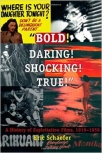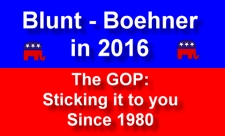In this country we are fortunate enough to have a miniature laboratory experiment in what can happen when the church and the state are commingled.
The state is Utah and the church is the Church of Jesus Christ of Latter Day Saints (popularly known as the Mormon church). No reasonable person can doubt the immense religious, social and political power that the Mormon Church wields over its members. Their actions in the 2008 Prop Hate debacle in California was enough to prove that ten times over.
Of course the "one true church" -- along with its poor benighted sock-puppets-of-god members -- is quick to disagree with that, preferring to give lip service to that whole "render unto Caesar..." thing in the New Testament, but an examination of their history and especially their "official" doctrine gives the lie to that position.
No less an authority than Mormon "apostle" (you don't get very much higher in the church hierarchy than being one of the Twelve Apostles) Bruce McConkie, in his monumental work Mormon Doctrine, says, in connection with a discussion on the Mormon doctrine of "blood atonement" (an antithetical-to-Christianity concept that there are some sins that the blood of Christ did not wash away and therefore the blood of the sinner must be shed -- which is why Utah remains the only state to administer its death penalty by firing squad), that the "...doctrine can only be practiced in its fullness in a day when the civil and ecclesiastical laws are administered in the same hands".
Got that? can only be practiced in its fullness in a day when the civil and ecclesiastical laws are administered in the same hands. No separation of church and state for those people, no sirree.
Utah's bizarrely arcane liquor laws were the laughingstock of the nation for years, but the Mormons were never big on banning booze outright. In fact, it was surprisingly the Utah legislature that cast the deciding vote to pass the 21st Amendment, thereby repealing Prohibition. The Mormons consider it a sin to drink alcohol, but that doesn't prohibit them from selling it to "gentiles" (i.e., any non-Mormon; even Jews are "gentiles" in the eyes of the Mormons).
It's an open secret in the state of Utah that the church is actually a "shadow government", and since upwards of 90% of the legislature consists of "worthy members of the church", how difficult is it really to pass -- or defeat -- legislation solely on the dictates of the inerrant "Prophet, Seer and Revelator" at the pinnacle of the church hierarchy?
And the Mormons see absolutely nothing wrong with that. They are the true believers who belong to the "one true church" (in Mormon doctrine, all other churches/religions -- even including all Christian churches -- are "apostate" and therefore without the blessings of god), and their church is of course set up in a facsimile Old Testament patriarchy, avoiding all that messy stuff that happens when people think for themselves. You know, like democracy and freedom and liberty...
In Utah we have a microcosm -- a living laboratory if you will -- of what can happen if we don't maintain that wall of separation. The only thing that's kept Utah from becoming an out-and-out theocracy is that pesky little Establishment Clause in the US Constitution and a Supreme Court that, for the most part, has ruled in support of it.
Friday, April 02, 2010
Mormons, Blood Atonement and the Separation of Church and State
Posted by Farnsworth68 at 11:15 AM
Labels: Blog Against Theocracy, mormons, separation of church and state











2 Comments:
Wow, you are really out there. I hope you feel better after your little vindictive rant. I don't know what is eating you rotten inside, but I am sure glad it isn't in me.
As for your last sentence about the constitution, could you please support it with something substantial? I don't think you know what you are talking about, you just bla bla bla
Whatever. Tell me where I am wrong, Mister Bla bla Bla yourself.
Until the absorbtion of the Mormon State of Deseret into the United States following the Mexican War, it is well known that the church, under the distatorial hand of Brigham Young, was the absolute ruler of the Mormons. There was no concept of the separation of church and state -- the church was the state and vice versa. And you are trying to say that it wouldn't be that way now, but for the effects of the establishment clause of the First Amendment?
I refuse to engage in a battle of wits with an unarmed man...
Post a Comment